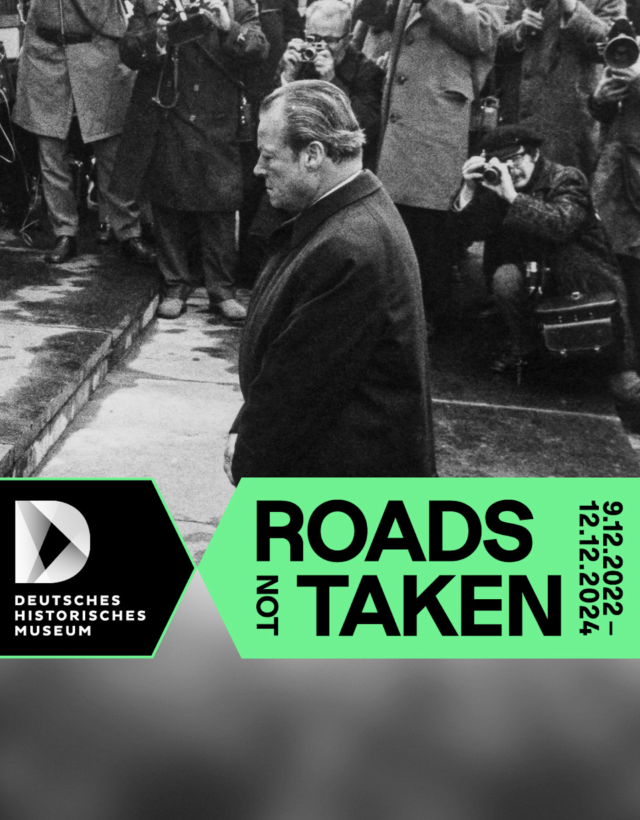https://www.sueddeutsche.de/politik/corona-impfgegner-rechtsextreme-antisemitismus-1.5362745
https://www.sueddeutsche.de/politik/corona-impfgegner-rechtsextreme-antisemitismus-1.5362745
Almost from the outset, at least allegedly, there was a mobilisation against government protective measures and the COVID-19 vaccination. On the street, esoterics and opponents of vaccination found themselves alongside right-wing extremists and conspiracy ideologists. Again and again, comparisons were made with National Socialism. Jana from Kassel imagined herself in the spirit of Sophie Scholl, the Nuremberg trials were being demanded and the so-called “Judenstern” (“Jew’s star”) was so often used in the context of the protests as a symbol of alleged oppression that the state had to react while the comparisons were at least partially classified as incitement to hatred.1
The extent to which such narratives are prevalent in society, and especially among those prepared to protest, has been demonstrated by the Center for Monitoring, Analysis and Strategy (CeMAS) in a population-representative survey. The results show that this is a systematic problem that also affects younger people.
https://www.bs-anne-frank.de/revisionismus
https://www.bs-anne-frank.de/revisionismus
Nazi Comparisons as a Political Instrument
Using the Nazi dictatorship or the Shoah as a basis for comparison for any purpose has a long, inglorious tradition in dealing with German history. Behind such comparisons stand a diverse range of intentions – from attempts to better understand a current event, to generating attention, to equation with other historical or contemporary experiences of violence.
Of course, such comparisons are not fundamentally reprehensible or even forbidden. Especially in right-wing populism and right-wing extremism, however, these historical revisionist comparisons are repeatedly used to relativise the crimes of National Socialism and antisemitism as a whole. This is also about interpretive sovereignty over history.2
The protests of the past two years, which were at least ostensibly directed against the government’s Corona measures, have now produced a multitude of corresponding visual motifs, slogans and actions that reveal a clear political motivation. This is usually not an attempt to better understand the current Corona measures by means of historical comparisons, for example, but rather a tasteless equation that makes a mockery of the victims of the Nazi regime.
At least a rudimentary factual knowledge of the Nazi regime and the Shoah seems to be present, from which, however, as if from a quarry, bits of information are extracted and used at will. Without regard to the mechanisms of the Nazi regime and its crimes, which have been researched in detail, perpetrators, victims or resistance fighters are taken out of context and reinforce a highly problematic image of history in the protest milieus.
For example, the comparisons of doctors and politicians with leading Nazi perpetrators – such as Christian Drosten with the SS doctor Josef Mengele – and the accompanying reduction of perpetrators of the Holocaust to individual “monsters” make it much easier for the protesters to present themselves as victims of an equally inhumane dictatorship in the present. Of course, this does not happen in a vacuum, but must be seen in the context of the German way of dealing with the past in which, even 80 years later, a correspondingly simplified idea of perpetration under National Socialism is widespread. Nevertheless, the data collected in the representative CeMAS study on the comparison with the Nazi dictatorship represents a new and more worrying stage.
Data from this study have already been published by CeMAS. The results can be viewed at cemas.io.
Data from this study have already been published by CeMAS. The results can be viewed at cemas.io.
The Study Results: Nazi Comparisons in German Society
Comparisons or not - to imagine oneself living in a Nazi dictatorship goes one step further.
In this study, a representative sample of German citizens was asked about their attitudes and behaviours. The survey focussed on, among other things, conspiracy narratives about the pandemic as well as attitudes to the protective measures during the COVID-19 pandemic. The recruitment of the participants was planned in such a way that the sample reflects distribution in the total population according to central parameters such as age, gender and federal state.
The survey, which was conducted online by the market research institute Bilendi & respondi, took place in Germany in the period from January 17th to January 22nd
2022 in which 2,202 people over the age of 18 took part. Following data cleansing, the data of 1,970 people in Germany could be used. The survey was conducted using a standardised questionnaire, which, in addition to socio-demographic information on gender, age, school education, income, political attitudes and information on vaccination status, also included measuring instruments for recording political and ideological attitudes, the spread of conspiracy narratives and protest events.3
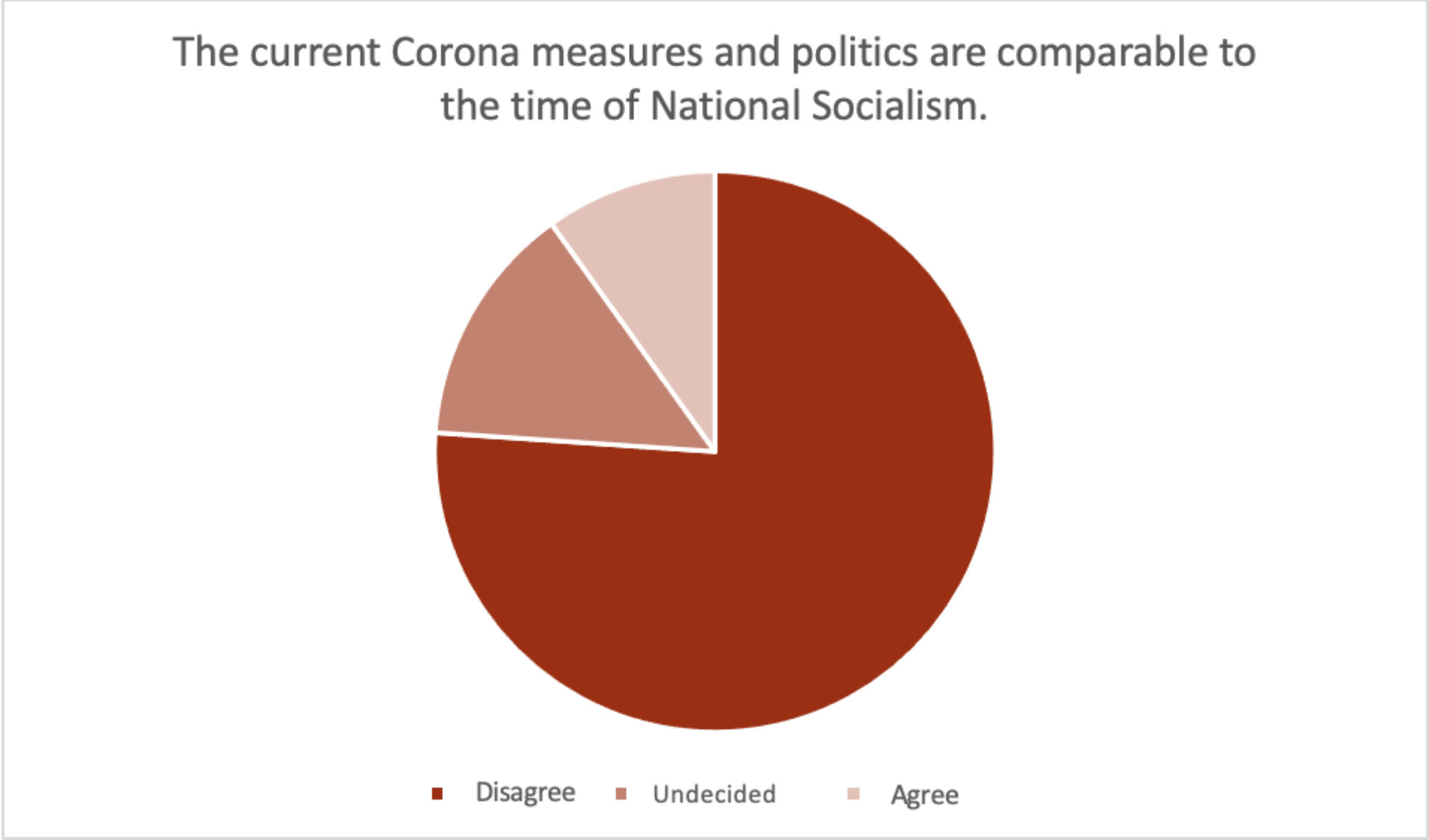
The results show: Almost 10% of those who responded to the representative CeMAS survey in Germany agree with the statement that "the current Corona measures and politics are comparable with the time of National Socialism".
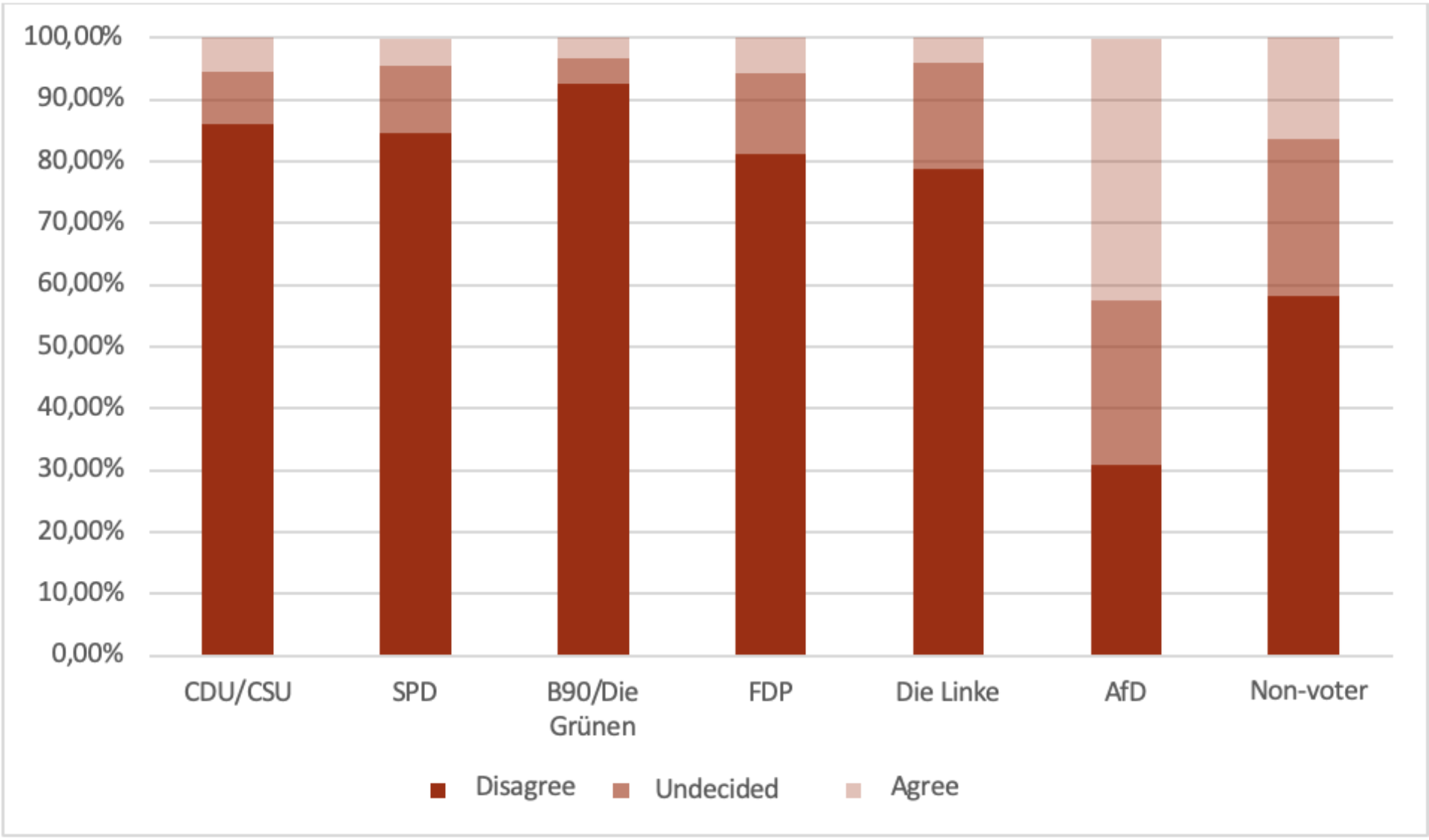
A more detailed look at the respondents reveals significant differences and makes it clear that certain milieus have massively abandoned the social consensus. As expected, the approval ratings on the question of comparability are many times higher for both non-voters and supporters of the AfD. Among the latter, those who reject a comparison of the Corona measures with National Socialism are even clearly in the minority.
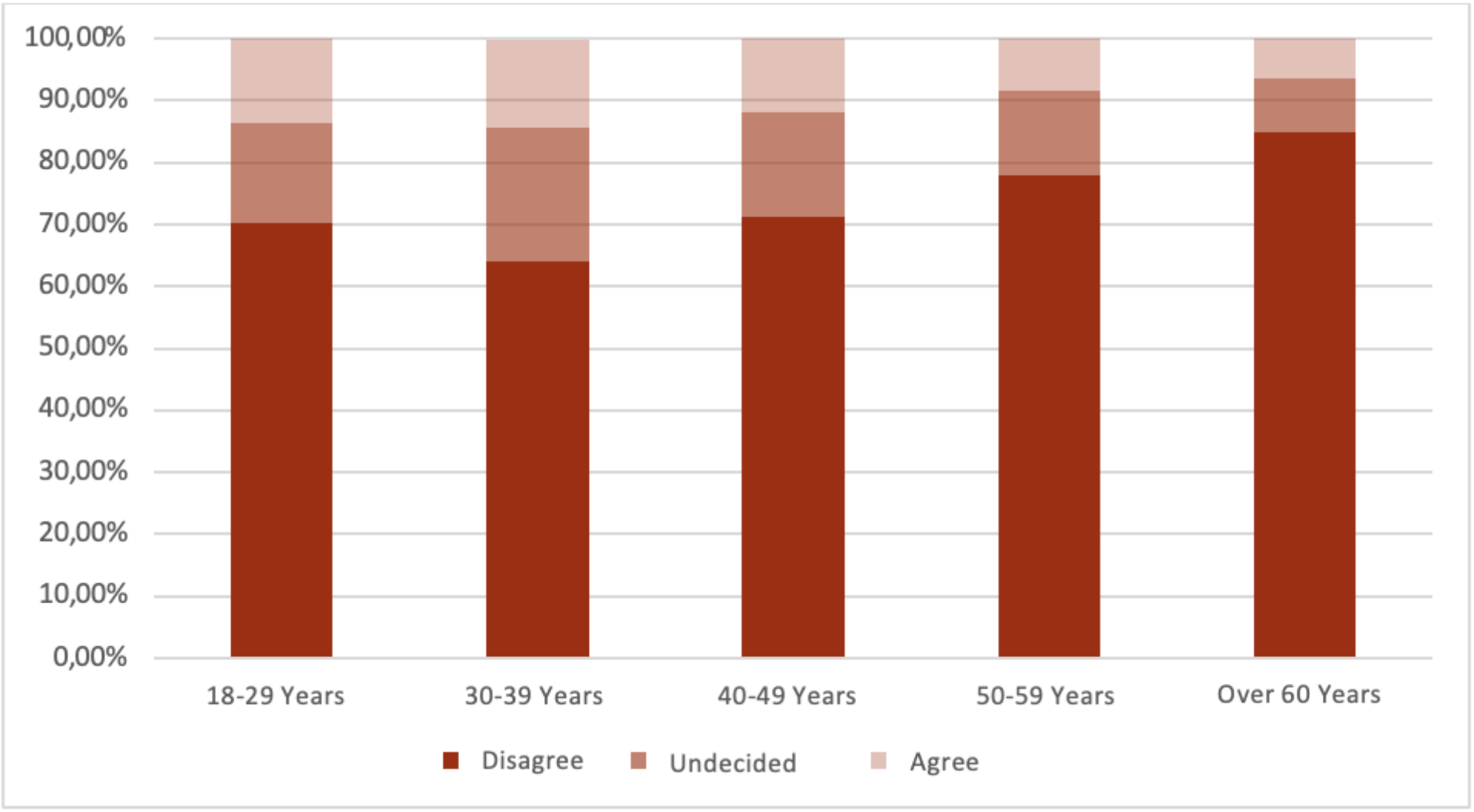
It is also worrying that the approval of comparisons of the Corona measures with National Socialism is significantly higher among younger people than among older people. This once again underlines the importance of explaining the Shoah and the crimes of National Socialism.
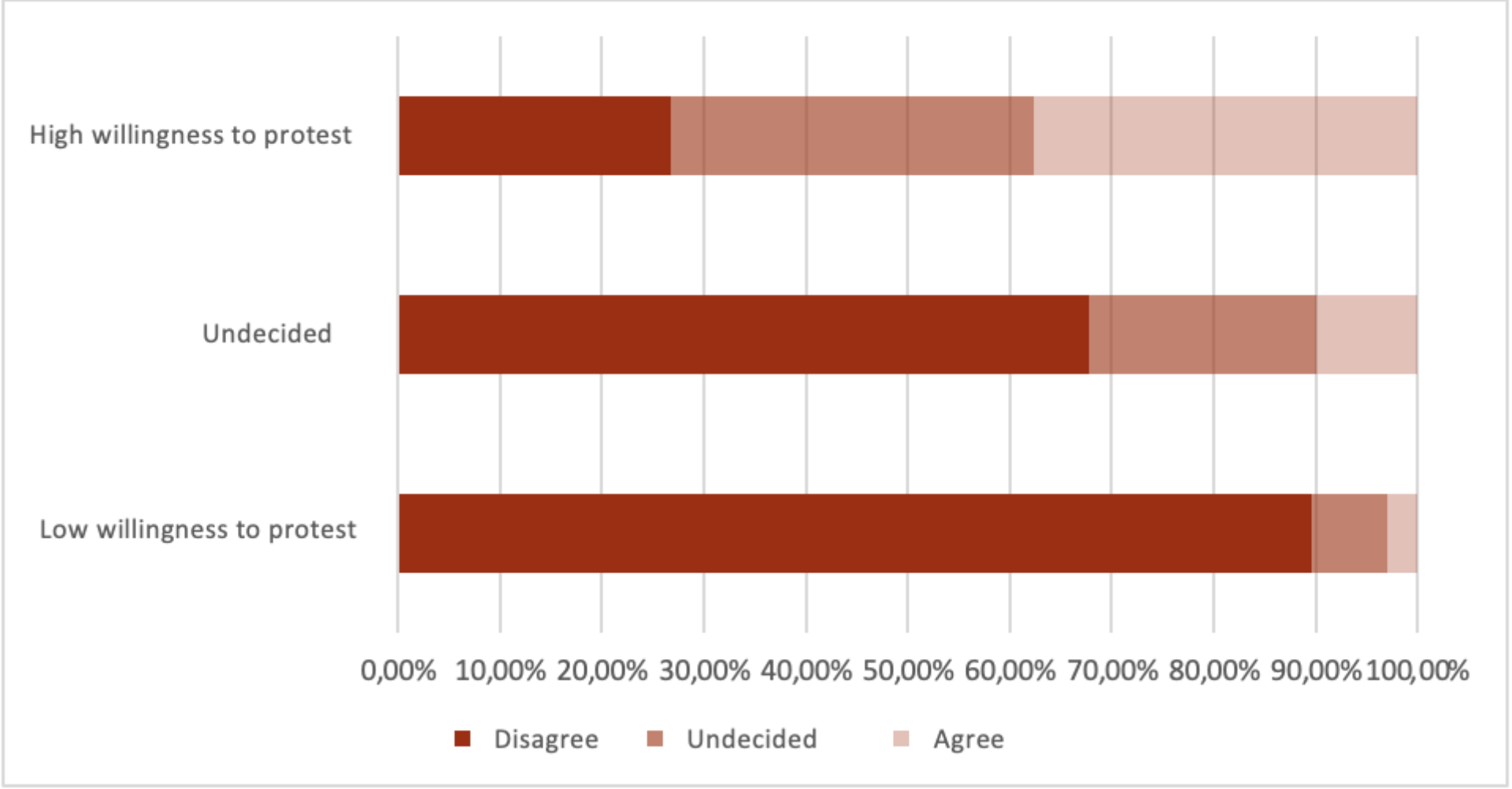
The connection between historical revisionist Nazi comparisons can be found not only on the street, but also in the survey results: Of those who show a high willingness to protest in the survey, 37% agree that the Corona measures and current policies can be compared to National Socialism. This is not surprising, as the idea of life under a dictatorship and the willingness to take action against it are probably mutually dependent. Above all, however, it also shows that approval of this comparison – which, from a scientific point of view, is unfounded – is not without its dangers.
The idea that one’s own situation in the present is to be equated with a dictatorship – perceived as monstrous, as one can see from the Mengele comparisons – makes it easier to cross the threshold of violent protest. Therefore, participants in the protest milieu regularly compare themselves with resistance fighters against the Nazi regime and see corresponding actions against the political system and the representatives of this system as a duty. In this way, the historical equation becomes the justification for action in the present.
Conclusion
In recent years, the first reaction to relativising comparisons with National Socialism has often been the call for more education. There is a lack of factual knowledge, and thus this is the only way that corresponding ideas can arise in people's minds. After more than two years of the pandemic, however, this can no longer be the only answer. These comparisons are usually made not because the facts about the crimes of the Holocaust are unknown, but because people see themselves on par with them.
It is precisely with those people, where the refusal of vaccination is combined with a willingness to protest, a voting behaviour tending towards right-wing extremism and a conviction that they live under a dictatorship, that one does not get very far by conveying factual knowledge. The political decisions during the pandemic are put on a level with the murderous Nazi regime – with the intention of making exactly this statement.
Historical-political education remains an important building block for democratic practice and the culture of remembrance. As the survey results show, this is also illustrated by the fact that the approval ratings for the trivialisation of National Socialism are higher among younger people than among older respondents. In order to be able to develop strategies against antisemitism and historical revisionism, historical knowledge is required, but also knowledge of the codes from the right-wing extremist milieu, which always wants to reinterpret history.
Socially, a clear position must be taken when the crimes of the Shoah are relativised and socially normalised more and more.
The prevention of this is a fundamental democratic task.
Steffen Jost is Program Director at the Alfred Landecker Foundation.
Pia Lamberty is Managing Director of CeMAS.

